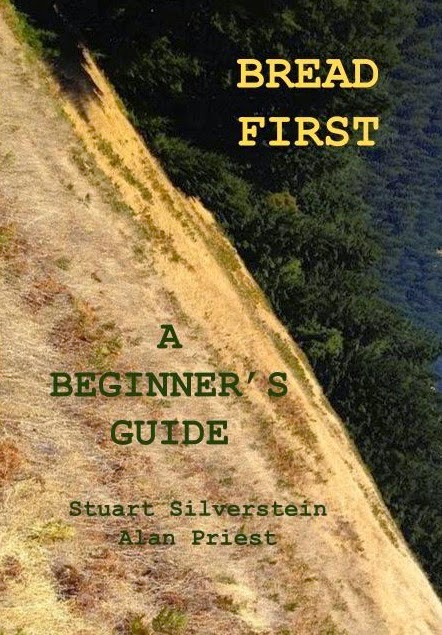How Skowhegan grew into Maine’s new bread basket
To watch the video taken during the Kneading Conference, go here:
Posted July 26, 2013, at 7:23 p.m.

Kevin Bennett | BDN
Dawn Woodward, left and Naomi Duguid put on a yeasted crackers workshop during the Kneading Conference held at the Skowhegan Fairgrounds on Thursday. Buy Photo

Kevin Bennett | BDN
Alex West of Hartland uses a tube to blow on a fire in an earth oven he has built as part of a workshop during the Kneading Conference held at the Skowhegan Fairgrounds on Thursday.

Kevin Bennett | BDN
J. Patrick Manley III instructs a small group of wood-fired oven hobbyist on how to build a brick oven during the Kneading Conference held at the Skowhegan Fairgrounds on Thursday.

Kevin Bennett | BDN
A small crowd of about 50 people gather around Dawn Woodward and Naomi Duguid as they put on a yeasted crackers workshop during the Kneading Conference held at the Skowhegan Fairgrounds on Thursday. Buy Photo

Kevin Bennett | BDN
Alex West, right, of Hartland watches as Stu Silverstein, left, leads a workshop on earth oven building during the Kneading Conference held at the Skowhegan Fairgrounds on Thursday. Buy Photo

Kevin Bennett | BDN
A small group of bread and grain hobbyist gather to hear Sam Hayward speak on the subject "Loaves and Fishes: Telling Maine's Story with Food" at a workshop during the Kneading Conference held at the Skowhegan Fairgrounds on Thursday. Buy PhotoSKOWHEGAN, Maine — A burgeoning industry focused on grain production in Somerset County was on display this week in SkowheganThe Maine Grain Alliance hosted its sixth annual Kneading Conference on Thursday and Friday, an event that has received national attention for its focus on local grain production, milling and bread making with flour from locally raised grains.
Roughly 250 people were expected to attend the conference, which includes informational workshops on everything from building wood-fired clay brick ovens to how to mill acorn flour.
One of the lead organizers behind the event is Amber Lambke, executive director of the Maine Grain Alliance and co-owner of the Somerset Grist Mill in Skowhegan, which began milling locally grown grains into flour in September 2012. Lambke and her business partner, Michael Schulz, are already buying grain from a dozen Maine farmers and selling the flour under the Maine grains label to markets throughout New England.
“We’ve been symbolic of the business growth that can happen when we pay attention to grains,” Lambke said.
The Kneading Conference and the Somerset Grist Mill are part of a calculated economic development strategy for the Skowhegan area.
The ball got rolling in 2007. Lambke, who had been volunteering for Main Street Skowhegan, had been reading Charting Maine’s Future, the report published in 2006 by the Brookings Institution that laid out a strategy for Maine’s economic future.
One of the report’s main recommendations was to focus on existing strengths and promote cluster development around those strengths.
In Skowhegan, Lambke and a group of people began to notice trends that pointed to what one of the area’s strengths could be. First, more and more bakers around Maine were struggling to find enough flour made from Maine-grown grain. Second, a local mason who built wood-fired bread ovens found his trade to be in increasing demand from people around the country who wanted to bake their own bread.
“It was kind of a culmination of bakers and a mason and some of us who jumped in as community organizers and volunteers who cared about Skowhegan’s revitalization,” Lambke said. “We came together and decided to launch a conference that brought these different trades together to talk about how we could work together to revive a regional grain economy.”
While farmers in Aroostook County have continually grown grain for hundreds of years, Lambke said grain production had all but ceased in the rest of the state as the availability of inexpensive grain started arriving from the midwest.
At one time, Maine was the breadbasket of New England, she said. In the 1830s, farmers in Somerset County produced 239,000 bushels of wheat a year (a bushel of wheat equals roughly 60 pounds), she said.
In 2007, only one farm in Somerset County produced wheat, according to the 2007 Census of Agriculture, the most recent data available. That farm’s production in bushels was not reported to avoid disclosing proprietary information. (The Census of Agriculture is completed every five years, but the 2012 census data likely won’t be available until 2014.)
There are today at least 22 farms in the Skowhegan area growing wheat, Lambke said, though they’re not all growing it for human consumption.
While more farmers began growing wheat, another piece of the puzzle was still missing: the infrastructure necessary to mill those grains into flour. Lambke said there were at one time 13 mills in the Skowhegan area, with the last one closing in the 1950s.
So, as the Kneading Conference got established and started bringing together various bread bakers, farmers and oven builders, Lambke turned again to the strategies she had read about in Charting Maine’s Future.
“The concept was that a lot of these businesses were interconnected and without one the others can’t succeed, so the cluster concept encourages us to look at where the leaks and where the gaps are,” she said.
The answer was obvious. “The milling infrastructure was simply missing,” Lambke said.
So Lambke, who had no prior experience in milling, baking or even farming (she’s actually a speech pathologist by training), decided she wanted to build the Skowhegan area’s first grist mill in more than half a century.
Lambke and Schulz bought the former Somerset County Jail in 2009 for $65,000. They spent several years raising money through investors associated with Slow Money Maine and with a Kickstarter campaign. The pair officially launched milling operations in September, and expect to buy grain from a dozen farmers in Maine this year.
The mill is now churning out stone-ground flour and oats from Maine-grown grains and selling it under the Maine Grains brand to markets in Maine, Massachusetts, Vermont, Boston and New York City. It will soon be supplying grain to Whole Foods’ production bakery in Boston.
Lambke said she saw the mill “as a real opportunity. If the infrastructure were here, we could encourage more grain production on farms.”
One of those farmers she hoped to encourage is Adam Nordell, who moved to the area three years ago with his partner, Johanna Davis, to take advantage of farming land along the Sandy River, which he called “some of the best soil in the state.”
Nordell and Davis run Songbird Farm in nearby Starks.
Songbird Farm along with a few partners is launching a community-supported agriculture program focused on grains and dry goods. It works like other, more common CSA programs, in which a person at the beginning of the season buys a share of a farmer’s future harvest, but instead of receiving a weekly batch of veggies, members of Songbird Farms’ CSA receive fresh-ground wheat flour, buckwheat, oats and heirloom dried beans.
“I don’t know if we could be doing what we’re doing in other parts of the state,” Nordell said. “It’s phenomenally exciting — the buzz that’s building and the knowledge around grains that’s building here in Skowhegan.”
Four years ago, witnessing this rising interest in locally grown grains, it became clear to Ellen Mallory, a sustainable agriculture specialist at the University of Maine Cooperative Extension, that there was a need for more research on what it takes to grow grain in Maine and to produce educational resources for farmers interested in doing so.
As the milling infrastructure disappeared when farmers stopped growing grain, so did much of the knowledge necessary to grow those grains. To reclaim that knowledge, Mallory, along with partners in Vermont, in 2009 created the Northern New England Local Bread Wheat Project with a $1.3 million grant from the U.S. Department of Agriculture.
She’s now a board member of the Maine Grain Alliance and helps farmers such as Nordell grow grain.
“Skowhegan is starting to become more of an example of how to foster economic development based on agricultural-based industry,” Mallory said. “I think for Maine that holds a lot of potential.”
The conference has spun off several local businesses, according to Lambke.
Joel Alex has plans to open a small-scale malt house in Skowhegan that would produce malt barley for the craft brewing and distilling industry. He considered locating in Aroostook County, but was drawn to Skowhegan because of the Somerset Grist Mill and the general energy in the area around grain production.
“I think Skowhegan has this energy about it,” Alex said. “It’s this up-and-coming food center, and Amber [Lambke] has been great about making that about grain. I think among people who are familiar with food systems in Maine we’re starting to hear a buzz growing around Skowhegan as a food hub, and in particular grains.”
When Jim Amaral launched Borealis Breads in 1993, the ability to buy flour made from Maine-grown grains was near impossible.
“Finding a couple hundred pounds was an issue,” he said.
But he persevered, and began talking to farmers around Maine in an effort to drum up interest in growing grain for food production, which is higher quality than the grain farmers will grow as animal feed. He hooked up with Matt Williams, a farmer in the Aroostook County town of Linneus, who began in 1997 growing grain for Borealis Breads. In 2002, Williams began his own milling operation, which is now called Aurora Mills and Farm.
After years of struggle, Amaral can now look back and say he played a big part in kickstarting the rebirth of Maine’s grain industry.
This year, he’ll use roughly 60,000 pounds of Maine flour to bake his bread. In fact, this week he put in his first order to Maine Grains for two pallets of wheat flour from the Somerset Grist Mill.
The buzz around local food and local grains in Skowhegan creates a “social glue,” Amaral said. “Food brings people together in a lot of different ways.”
Amaral believes the benefits of the Kneading Conference in particular, which provides plenty of informational workshops and inspiration, will continue to bear fruit long into the future.
“It’s easy to underestimate the impact an event like this has on the community, but it is pretty remarkable” he said. “It’s like throwing a stone into a pond. The ripple effect over a month, six months, a year, five years, 10 years, I think will be pretty remarkable. The next Stonewall Kitchens of Maine may come out of a workshop here.”
While the conference will be over by Saturday, the Maine Grain Alliance will host an artisan bread fair at the Skowhegan State Fairgrounds from 9 a.m. to 3 p.m., which is free (though bring $2 for parking) and open to the public.
Lambke expects as many as 3,000 people to attend the artisan bread fair this year.
 Print
Print Email
Email Share
Share Tweet
Tweet






1 comment:
I was checking constantly this blog and I am impressed!
Extremely helpful information specifically the last part :) I care for such
info a lot. I was looking for this certain information for a
very long time. Thank you and good luck.
rs gold for sale
Post a Comment